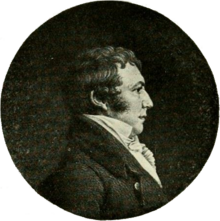| This article needs additional citations for verification. Please help improve this article by adding citations to reliable sources. Unsourced material may be challenged and removed. Find sources: "Theodore Gourdin" – news · newspapers · books · scholar · JSTOR (October 2018) (Learn how and when to remove this message) |
| Theodore Gourdin | |
|---|---|
 Gourdin in 1922 publication Gourdin in 1922 publication | |
| Member of the U.S. House of Representatives from South Carolina's 3rd district | |
| In office March 4, 1813 – March 3, 1815 | |
| Preceded by | David R. Williams |
| Succeeded by | Benjamin Huger |
| Personal details | |
| Born | (1764-03-20)March 20, 1764 near Kingstree, Province of South Carolina, British America |
| Died | January 17, 1826(1826-01-17) (aged 61) Pineville, South Carolina, U.S. |
| Resting place | Episcopal Cemetery, Saint Stephen, South Carolina |
| Profession | planter |
Theodore Gourdin (March 20, 1764 – January 17, 1826) was an American slaveholder and politician who served one term as a U.S. Representative from South Carolina from 1813 to 1815.
Life
Born near Kingstree in the Province of South Carolina, Gourdin was educated in Charleston, and in Europe. He owned a plantation, on which he enslaved people, in Moncks Corner, South Carolina.
Congress
Gourdin was elected as a Democratic-Republican to the Thirteenth Congress (March 4, 1813 – March 3, 1815).
Later career and death
After his term, he resumed agricultural pursuits.
He died in Pineville, South Carolina, January 17, 1826, and was interred in Episcopal Cemetery, St. Stephen, South Carolina.

Sources
- United States Congress. "Theodore Gourdin (id: G000345)". Biographical Directory of the United States Congress.
External links
 Media related to Theodore Gourdin at Wikimedia Commons
Media related to Theodore Gourdin at Wikimedia Commons
| U.S. House of Representatives | ||
|---|---|---|
| Preceded byDavid R. Williams | Member of the U.S. House of Representatives from South Carolina's 3rd congressional district 1813–1815 |
Succeeded byBenjamin Huger |